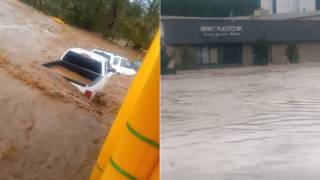
By Amy Goodman & Denis Moynihan
Climate Change, Christmas and Capitalism chaotically converged with an epic operational failure at Southwest Airlines that stranded thousands of holiday travelers and airline staff at airports for days. Winter Storm Elliott slammed the continental United States with snow, pelting winds and freezing cold arctic air in what meteorologists call a “bomb cyclone.” Air travel was understandably impacted, but the scale of the disruption at Southwest was many times greater than other airlines, accounting for an estimated 90% of the tens of thousands of canceled flights. Central to this travel catastrophe are the deregulation of the airline industry during the late 1970s, during the Carter administration, and the decision by Southwest executives to prioritize their investors over customers and staff.
“It is unconscionable…we have been sounding the alarm, along with our pilots’ union and other unions, that our technology issues are absolutely going to lead us to this place. This is not the first time. It is the first time it’s happened over a Christmas that’s affected so many,” Corliss King, vice president of Transport Workers Union (TWU) Local 556, representing Southwest Airlines flight attendants, said on the Democracy Now! news hour.
Her union has been in contract negotiations with Southwest for four years. Among the workers’ demands is that the airline fix “the technology failures that disproportionately impact frontline aviation workers and passengers.” Southwest uses software called SkySolver, released in the early 2000s, to correct scheduling interruptions by moving planes and staff around the country as fast and efficiently as possible. The storm overwhelmed Southwest’s dated system, as Corliss King explained:
“Crew scheduling, which is our heartbeat of our operation for our crews, is using technology that is not expandable to the airline we are right now…on a normal day, we have 500 people who are out of place, but due to a crisis, we now have a thousand people, 1,500 people out of place. That technology has to be able to expand to meet an unprecedented situation like this. That is not able to happen.”
Consequently, thousands of Southwest flight attendants and pilots were stranded, often with no place to stay other than in an airport’s crew lounge. Southwest had no way to match available crews with idle planes, lacking basic information about where their workers were. Meanwhile, ground crews were forced to work longer hours in the freezing cold, some suffering frostbite.
Tens of thousands of passengers have spent days stranded in airports, often separated from their luggage – some without medicines. Southwest told most passengers they wouldn’t be getting an alternate flight for several days at the earliest, claiming the airline lacked capacity.
“They have no capacity because it’s actually more profitable to have bad service than good service,” Paul Hudson, president of FlyersRights, an airline passenger rights organization, said on Democracy Now! “Every airline is required to have a plan to deal with bad weather and other disruptions, but there’s no enforcement. There are no reserve requirements. There are no customer service standards of any meaningful nature. The whole idea of deregulation was that the airlines would compete to provide better service. But actually what happens today, they compete to provide more profitable but worse service.”
For passengers experiencing multi-day flight delays, Paul Hudson warns, “Domestically, you have no rights to delay compensation. If weather is the reason for the cancellation or delay, you don’t really have any rights to things like hotel accommodations. It’s all up to the airlines. Of course, they’ll do anything to avoid those expenses.”
While Southwest has underinvested in its IT infrastructure and reserve capacity, it has treated its investors well. In the three years leading up to the pandemic, Southwest reportedly spent $5.6 billion on stock buybacks, and just weeks before the Christmas debacle announced it would be the first U.S. airline since the pandemic began to provide a stock dividend.
U.S. Transportation Secretary Pete Buttigieg tweeted on Wednesday, “Southwest Airlines needs to do everything it takes to get stranded passengers to their destinations–and cover their expenses (like meals, hotel, ground transport) in the meantime. We’ll continue to hold them accountable.”
This compensation is the least Southwest should do. However, according to the Transportation Department’s own website, “There are no federal laws requiring airlines to provide passengers with money or other compensation when their flights are delayed.”
Meanwhile, the climate emergency worsens. Air travel is estimated to produce 4% of the global greenhouse gas emissions annually. After a dramatic, pandemic-related drop in 2020, air travel has recovered and is increasing. Unless we make drastic changes to how we live, including how we travel, we will all be stranded, not at airports, but on this, our only, rapidly heating planet.












Media Options